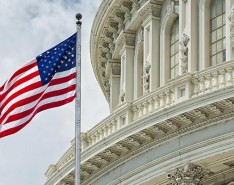WASHINGTON, D.C. (July 8, 2022)—The National Association for Home Care & Hospice (NAHC) and a group of likeminded organizations have written to Brian Slater, director of the Division of Home Health and Hospice in the Center for Medicare Centers for Medicare & Medicaid Services (CMS) to reiterate strong support for the authority of nurse practitioners (NPs) and clinical nurse specialists (CNSs) to order and certify home health services for Medicare beneficiaries.
NAHC
WASHINGTON, D.C. (June 21, 2022)—The annual proposed rule for Medicare home health services includes an estimated 4.2% or $810 million decrease in aggregate payments, said the Centers for Medicare and Medicaid Services (CMS) in its fact sheet on the rule. The rule would apply to calendar year 2023.
PORTLAND, Maine (June 10, 2022)—Home health nurse case managers with smaller caseloads typically have better quality of care and patient satisfaction ratings, according to LeadingAge’s“National Healthcare at Home Best Practices and Future Insights Study.” The association for nonprofit aging service providers released the results of the yearlong study this week.
BIRMINGHAM, Ala (May 18, 2022)—There’s a new coalition of homecare providers and associations taking on the home health nurse and caregiver shortage. The Home Care Workforce Alliance (HCWA), which is seeking to improve recruiting and retention in the home caregiver workforce, kicked off its initiatives with a conference call today.
WASHINGTON, D.C. (April 28, 2022)—Home health providers participating in the Home Health Value-Based Purchasing (HHVBP) model are performing 7% better than their counterparts, according to a new report from the Center for Medicare and Medicaid Innovations (CMMI). The model covers Medicare-certified home health providers in Massachusetts, Maryland, North Carolina, Florida, Washington, Arizona, Iowa, Nebraska and Tennessee.
ST. LOUIS (April 6, 2022)—The National Association for Home Care & Hospice (NAHC) is now accepting proposals to present new education at the 2020 Home Care and Hospice Conference & Expo in America's Center Convention Complex, St. Louis, Missouri, Oct.23-25, 2022.
The deadline for submissions is April 18, 2022.
WASHINGTON, D.C. (April 1, 2022)—On Monday, March 28th, President Biden released a $5.8 trillion proposed budget for fiscal year (FY) 2023, which begins Oct. 1, 2022. While the White House budget is simply a request and Congress has final say on government spending, it does provide a window into the president’s priorities and where his administration wants to direct its efforts going forward.
WASHINGTON, D.C. (March 22, 2022)—The National Association for Home Care & Hospice (NAHC) and a coalition of long-term and post-acute care (LTPAC) and health information technology (HIT) groups have submitted comments to an important congressional task force exploring ways to accelerate innovation in the health care system.
WASHINGTON, D.C. (March 11, 2022)—The National Association for Home Care & Hospice (NAHC) is pleased to formally announce that Kristen Wheeler has assumed the role of Executive Director of Private Duty Home Care at NAHC, effective Monday, March 7, 2022. Wheeler comes aboard following the departure of Emilie Bartolucci, who departed in November of 2021.
LAS VEGAS (February 16, 2022)—The National Association for Home Care & Hospice (NAHC) and the Home Care & Hospice Financial Managers Association (HHFMA) are announcing a call for speakers to the 2022 Financial Management Conference in Las Vegas, Nevada from July 24-26, 2022.
WASHINGTON, D.C. (February 1, 2022)—The National Association for Home Care & Hospice (NAHC) has joined a large group of likeminded organizations in urging leaders in both houses of Congress and both parties to ensure that Medicaid Home and Community Based Services (HCBS) remain part of any package that moves forward.
WASHINGTON, D.C. (November 18, 2021)—The Alliance for Home Health Quality and Innovation (AHHQI) and the National Association for Home Care & Hospice (NAHC) teamed up once again for the release of the 2021 AHHQI Home Health Chartbook.
WASHINGTON, D.C. (November 9, 2021)—The average hourly rate for registered nurses (RNs) in home health agencies increased 2.98% in 2021, according to the 2021-2022 Home Care Salary & Benefits Report, just released by Hospital & Healthcare Compensation Service (HCS). The report is published in cooperation with the National Association for Home Care & Hospice (NAHC).
WASHINGTON, D.C. (November 5, 2021)—Home health agencies dodged a bullet when it came to the federal governemnt’s new rule on home health care, said National Association for HomeCare and Hospice (NAHC) President Bill Dombi.
That’s because the Centers for Medicare & Medicaid Services (CMS) did not end up requiring spending cuts to achieve budget neutrality in the final Home Health Rule it issued this week—despite suggesting it would in the draft.
WASHINGTON, D.C. (November 2, 2021)—At a recent virtual event, Centers for Medicare & Medicaid Services (CMS) leaders, including Administrator Chiquita Brooks-LaSure and Center for Medicare and Medicaid Innovation (CMMI) Director Liz Fowler, unveiled the agency’s refreshed strategic vision for developing, implementing, and evaluating new care delivery and payment model demonstrations.
WASHINGTON, D.C. (October 29, 2021)—The Centers for Medicare & Medicaid Services (CMS) has submitted a proposal to conduct a mode experiment to test the effects of a web-based mode on response rates and scores, to the Office of Management and Budget.
The CMS proposal, an information collection request titled The Home Health Care CAHPS Survey (HHCAHPS) Mode Experiment, would be an addition to the three currently approved modes – mail, telephone and mail combined.
WASHINGTON, D.C. (October 22, 2021)—The RAISE (Recognize, Assist, Include, Support and Engage) Family Caregiving Advisory Council recently delivered to Congress key recommendations to support the millions of unpaid family caregivers that support older adults and people with disabilities.
Washington, D.C. (October 8, 2021)—The Choose Home Care Act of 2021 has been introduced in the U.S. House of Representatives. Introduced by Reps. Henry Cuellar (D-Texas) and James Comer (R-Kentucky), the bipartisan legislation is designed to increase access to home health care following hospitalization for eligible Medicare beneficiaries by offering a safe, high-quality post-acute option for nursing home level services in the home.
WASHINGTON, D.C. (October 7, 2021)—Registration is now open for the National Association of Home Care & Hospice (NAHC) Fall Forum, a live online event featuring 30 hours of essential education for homecare and hospice professionals.
Although the 2021 Home Care and Hospice Conference and Expo was canceled, the NAHC Fall Forum, Nov. 2-10, will offer what you have come to expect from NAHC: the best education in homecare and hospice, taught by the experts you know and trust.
WASHINGTON, D.C. (September 24, 2021)—The Medicare Payment Advisory Commission (MedPAC) met to discuss the development of a mandated report assessing the impact of the shift to the Patient Driven Groupings Model (PDGM) payment model for Medicare home health, and in particular the 30-day episode and the removal of therapy utilization in payment determinations.

 The National Association for Home Care & Hospice (NAHC), the Home Care Association of America (HCAOA) and BAYADA Home Health Care recently kicked off a new initiative to improve conditions, pay and recognition for homecare workers (
The National Association for Home Care & Hospice (NAHC), the Home Care Association of America (HCAOA) and BAYADA Home Health Care recently kicked off a new initiative to improve conditions, pay and recognition for homecare workers (